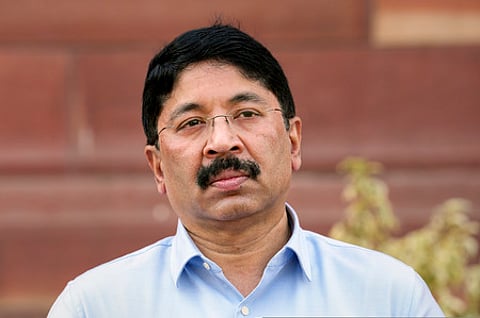

CHENNAI: With a legal notice allegedly served by Dayanidhi Maran, DMK Member of Parliament and former Union Minister, to his younger brother and Chairman of Sun TV Network, Kalanidhi Maran, the Maran family—prominent in Tamil Nadu’s political and media circles—is now embroiled in a significant legal dispute involving two of its key members.
Although Sun TV Network has stated that reports about the dispute are speculative, sources cited in earlier media coverage confirm that the legal notice, addressed to Kalanidhi Maran, his wife Kavery Kalanithi, and six others, alleges irregularities in share allotment transactions dating back to 2003.
Shares of Sun TV were trading down over 4% at ₹588 a share on the BSE, while it fell over 4% and trading at ₹586.40 a share on the NSE, on Friday’s morning trade, though it recovered slightly to Rs 597.84, down 2.34 % at 1.38 PM post Sun TV clarification.
According to two corporate legal experts who spoke to The New Indian Express (TNIE Online) on condition of anonymity, the legal and regulatory implications of the dispute could be serious if the allegations are proven true.
“The allotment of shares without proper approval and the subsequent diversion of dividends could trigger scrutiny from the Securities and Exchange Board of India (SEBI) and the Ministry of Corporate Affairs, alongside potential criminal investigations for breach of fiduciary duties,” said a senior corporate lawyer based in Mumbai.
“With allegations involving large sums of money and shareholding dilution, the legal proceedings ahead could be protracted and impactful—not just for the Maran family, but for the broader media landscape in Tamil Nadu,” added the second expert.
According to media reports quoting the contents of the notice, on September 15, 2003—just seven days after their father, Murasoli Maran (also known as S.N. Maran, former Union Minister), was brought to Chennai in a comatose state from the U.S.—Kalanidhi allegedly allotted 60% of the company’s shares to himself.
This allotment was reportedly made without consultation or approval from the original promoters and was carried out in collusion with others.
As a result, the shareholding of the original promoters—namely M.K. Dayalu (widow of the late M. Karunanidhi) and the legal heirs of S.N. Maran—was allegedly diluted from 50% each to just 20% each.
The notice claims Kalanidhi derived substantial financial benefit from this action, reportedly receiving dividends amounting to ₹5,926 crore up to 2023, with a further ₹455 crore projected for 2024.
Sun TV Network, a leading media conglomerate in South India, originally began as Sumangali Publications Pvt. Ltd. and has since evolved into a dominant player in the regional television and media space.
The legal notice, which asserts that from the inception of Sun TV until September 15, 2003, Kalanidhi Maran served only as a salaried employee without holding any ownership stake, demands:
Restoration of the original shareholding structure of Sun TV Network and its related entities as it stood on September 15, 2003.
Reinstatement of shares to the rightful owners, specifically M.K. Dayalu and the legal heirs of S.N. Maran.
Immediate return of all monetary benefits, dividends, assets, and other income allegedly unlawfully received by Kalanidhi and Kavery Kalanithi since 2003.
Initiation of appropriate civil, criminal, regulatory, and enforcement proceedings if these demands are not complied with promptly.
Although Kalanidhi Maran has yet to issue a public response to the legal notice, the case underscores a deep family rift with significant legal, financial, and political ramifications, given the Maran family's prominent role in Tamil Nadu’s political and media landscape.
The Maran brothers are scions of the Karunanidhi family, a major political force in Tamil Nadu for decades. The family's intertwined interests in politics and business have often made internal disputes particularly sensitive and high-stakes.
Established in the early 1990s, Sun TV has grown into one of India’s largest regional television networks, with diversified media interests. Control of the company carries substantial economic power and significant influence over media narratives in South India.
Given that both brothers are influential figures within the Dravida Munnetra Kazhagam (DMK) party, public exposure of such a family dispute could also have ramifications for party unity and public perception, according to a Chennai-based political observer.